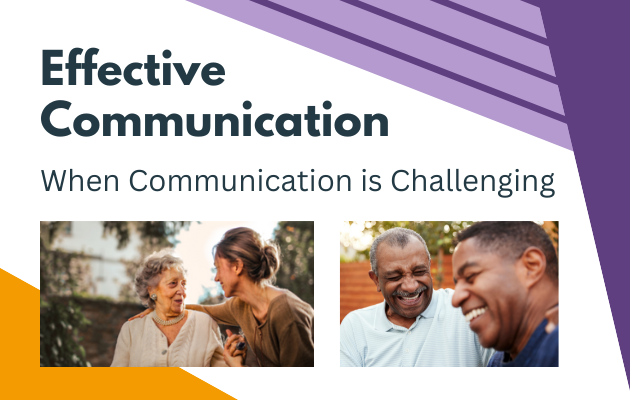Effective Communication When Communication is Challenging

Changes in the ability to communicate with an individual living with dementia can vary and are based on the person and where he or she is in the disease process. Problems you can expect to see throughout the progression of the disease include:
- Difficulty finding the right words
- Using familiar words repeatedly
- Describing familiar objects rather than calling them by name
- Easily losing a train of thought
- Difficulty organizing words logically
- Reverting to speaking a native language
- Speaking less often
- Relying on gestures more than speaking
Suggestions for Effective Communication:
- Engage the person in one-on-one conversation in a quiet space that has minimal distractions.
- Speak slowly and clearly.
- Maintain eye contact. It shows you care about what he or she is saying.
- Give the person plenty of time to respond so he or she can think about what to say.
- Be patient and offer reassurance. It may encourage the person to explain his or her thoughts.
- Ask one question at a time.
- Ask yes or no questions. For example, “Would you like some coffee?” rather than “What would you like to drink?”
- Avoid criticizing or correcting. Instead, listen and try to find the meaning in what the person says. Repeat what was said to clarify.
- Avoid arguing. If the person says something you don’t agree with, let it be.
- Offer clear, step-by-step instructions for tasks. Lengthy requests may be overwhelming.
- Give visual cues. Demonstrate a task to encourage participation.
- Written notes can be helpful when spoken words seem confusing.
For more information visit the Alzheimer’s Association’s page on Communication and Alzheimer’s.
Related blogs you may also find helpful:
